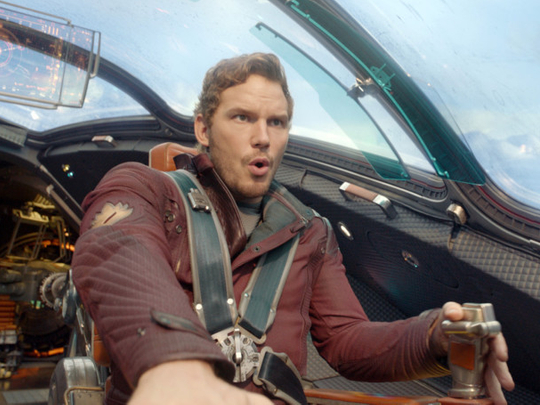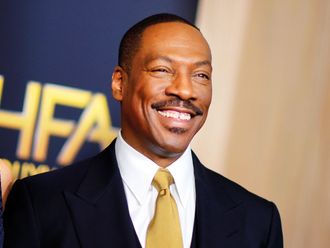
The delay of major movies from Pixar and Universal. The pirating of “The Expendables 3” and “Annie” before their release. Warner Bros. suffering one dud after another. Cyberterrorists forcing the cancellation of a big Sony comedy.
Hollywood does not want a sequel to 2014.
For the year, ticket sales at North American theatres will total roughly $10.5 billion (Dh38.6 billion), a 4 per cent decline from a year earlier, according to projections by the box office data firm Rentrak. Attendance will drop by about the same percentage.
Annual fluctuations of that size are not uncommon at the domestic box office, which rises and falls based on the strength of the movie line-up. Still, that total would give the movie business its lowest tally since 2000, after accounting for inflation.
Despite some major successes — “Guardians of the Galaxy,” “The Lego Movie,” “Godzilla,” “Divergent,” “Teenage Mutant Ninja Turtles” and “The Maze Runner” all revived franchises or started new ones — box office weakness stretched into nearly every genre and audience segment. There was no big-budget catastrophe like “The Lone Ranger,” but at least a dozen films underperformed in domestic theatres, suggesting structural weakness, analysts said.
Expensive films like “The Amazing Spider-Man 2” and “The Hunger Games: Mockingjay, Part 1” missed their box office mark. So did mid-budget comedies, including “Muppets Most Wanted,” “A Million Ways to Die in the West,” “Sex Tape” and “Horrible Bosses 2.” Once-reliable animated films hit a rough patch in 2014, as releases like “Penguins of Madagascar” and “Planes: Fire and Rescue” disappointed.
No arty drama was poised to match the kind of breakout status reached in recent years by “Black Swan” or “Lincoln.”
Hollywood’s primary worry is that moviegoing in North America is changing along generational lines. In particular, young ticket buyers traditionally turned out weekend after weekend — with the quality of the films mattering less than the opportunity to fraternise. But this group is staying home more often. Reasons include video games, YouTube, smartphone preoccupation and ever-increasing on-demand film alternatives.
The Nielsen Co. said this month that the moviegoing of Americans ages 12 to 24 dropped 15 per cent in the first nine months of 2014, compared with the same period a year earlier.
American women were strong Hollywood supporters over the last year, adding financial sizzle to movies like “Maleficent,” “The Fault in Our Stars” and “Lucy.” But studios as a whole remain laser-focused on testosterone-fuelled action extravaganzas because those pictures are the ones being gobbled in growing overseas markets.
Paul Dergarabedian, a senior Rentrak analyst, said it was a series of unfortunate events that cumulatively resulted in an off year for the industry.
“Studios and theatre owners just couldn’t catch a break, with lots of little things adding up,” Dergarabedian said.
And some big things: Christmas is typically one of the busiest times of the year for Hollywood, but movie executives are worried that some consumers will stay home because of a recent terror threat to theatres.
Last week, hackers threatened violence against any theatre showing “The Interview,” a $44 million Sony comedy about the assassination of North Korean leader Kim Jong Un. When the vast majority of the country’s theatres backed out of playing the movie, Sony cancelled all release plans, at least for now.
Weekend ticket sales at North American theatres gave studios mixed messages about consumer confidence.
“The Hobbit: The Battle of the Five Armies” from Warner and Metro-Goldwyn-Mayer took in $56.2 million over the weekend, for a strong total since opening on Wednesday of $90.6 million — slightly better than the five-day total for last year’s “Hobbit” instalment.
But “Night at the Museum: Secret of the Tomb” and “Annie” both opened to so-so results, and total weekend ticket sales dropped nearly 6 per cent compared with the same three days last year.
“It’s been a rather sluggish market since Thanksgiving,” said Chris Aronson, president of domestic distribution for 20th Century Fox.
Fox had a better year than its competitors. Powered by hits like “X-Men: Days of Future Past,” “Dawn of the Planet of the Apes” and “Gone Girl,” Fox will end 2014 as Hollywood’s No. 1 studio based on domestic box office market share, according to the data company Box Office Mojo.
For the year, the No. 1 movie in the United States and Canada was Disney-Marvel’s “Guardians of the Galaxy,” which took in $332.6 million, for a global total of $772.2 million. The second-biggest draw was “The Hunger Games: Mockingjay Part 1,” a Lionsgate film that has so far generated $289.2 million ($639.7 million globally).
Disney-Marvel’s “Captain America: The Winter Soldier” was third, taking in $259.8 million ($714.1 million globally). The biggest film on a global scale was Paramount’s “Transformers: Age of Extinction,” with $1.1 billion in ticket sales.
On the opposite end of the scale, Sony’s year was difficult even before it was attacked by hackers, although its “22 Jump Street” and “Heaven is For Real” were standouts. And Warner, until recently Hollywood’s strongest movie operation, slumped badly, with hits like “The Lego Movie,” “Annabelle” and “The Battle of the Five Armies” offset by a string of clunkers: “Edge of Tomorrow,” “Transcendence,” “The Good Lie,” “Winter’s Tale,” “Blended” and “Jersey Boys.”
Studio executives and theatre owners primarily blamed the overall decline in ticket sales on the delay of several would-be blockbusters. The seventh instalment in Universal’s “Fast and Furious” series was pushed back following the death of one of its lead actors. Warner rescheduled “Jupiter Ascending.” Pixar, for the first time in nine years, did not release a movie, sending “The Good Dinosaur” back to the drawing board.
“We were missing a couple of big movies, and it hurt,” said Gerardo I. Lopez, the chief executive of AMC Theatres.
Whenever ticket sales take a tumble, Hollywood pulls the assertion of cyclicality out of its hip pocket: Just wait until next year — next year will be our best ever.
In the case of 2015, it might be true. Coming are expected box office monsters like “Star Wars: Episode VII — The Force Awakens,” “Jurassic World,” “Furious 7,” “Avengers: Age of Ultron,” “Fifty Shades of Grey,” the James Bond film “Spectre” and animated entries like “Minions” and Pixar’s “Inside Out.”
“North America should be able to break through the $11 billion barrier next year,” Lopez said. “That’s an easy green given what’s coming. We should be able to hit it, even though we’re a lot of yards out.”











